
Telehealth Newsletter
Official Newsletter of Tamil Nadu Chapter of Telemedicine Society of India
What is New?
TELEMEDICON 2023, held in the vibrant state of Goa, has concluded on a high note, leaving a lasting impact on the world of healthcare. This year’s event brought together a diverse range of healthcare professionals, technology experts, policymakers, and innovators to explore the cutting-edge advancements in telemedicine and its transformative potential.
Telemedicon 2023: A Resounding Success in Goa And Many First’s in TSI
Under the astute leadership of Dr.BS Ratta, TELEMEDICON2023 stood out and achieved its objective of showcasing a world class event with rich content, exchange of knowledge, global collaboration and wonderful networking opportunities to push the telemedicine forward in our country.
There were also many firsts during this meeting:
- An app helped make this a paperless meeting that was easy to ACCESS and navigate.
- Fireside Chats
- First Telemedicon Oration
- Master Classes
- Quiz Competition
- Best Hopper to the exhibition arena
- Highest attended AGM & Valedictory Functions
- TELEMEDICON2023 saw the first paper-based elections in its history for Vice President post.
TSI Executive Committee 2023-2025
The new Executive was elected and took office for the next 2 years. The names are listed below
Dr. R. Kim, President
Dr. Meenu Singh, Out Going President
Dr. Prem Nair, President Elect
Dr. Sunil Shroff, Vice President
Dr. Umashankar S., Hony. Secretary
Dr. Krishna Kumar, Treasurer
Mr. D. Satheesh Kumar, Joint Secretary
Dr. Amit Agrawal, Executive Member
Dr. Pawan Gupta, Executive Member
Dr. Raj Raval, Executive Member
Dr. T. Senthil, Executive Member
Dr. Sheila John, Executive Member
Mr. Surendr Singh, Executive Member
Dr. Surya Bali, Executive Member
TELEMEDICON 2023 in Goa achieved its goal of advancing the mission to make quality healthcare accessible to all, transcending geographical boundaries. It served as a catalyst for innovation, collaboration, and policy advocacy in the field of telemedicine.
As we bid farewell to this year’s event, the momentum generated at TELEMEDICON 2023 will continue to drive positive change in healthcare, with the promise of an even brighter future where technology and compassion combine to create healthier and more equitable healthcare systems worldwide. TELEMEDICON2024 is to take place next year at AIIMS, Bilaspur (Himachal Pradesh).
Thank you to all participants, speakers, and organizers for making TELEMEDICON 2023 a resounding success.
Thank You
Dr. Sunil Shroff
Chief Editor
Vice President, TSI
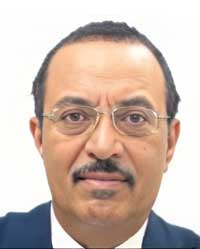
TELEMEDICON 2023: Emerging Technologies Connecting Indian Healthcare System
Dr B S Ratta
Organizing Chairman
TELEMEDICON 2023, Goa
19th International Conference of Telemedicine Society of India, Telemedicon 2023 and 27th International Conference of ISfTeH was held on 3rd, 4th and 5th November 2023 at Park Regis in Goa. The theme being ‘Emerging Technologies Connecting Indian Healthcare System’ – Presented by Serum Institute of India.
This three day feast of Academics, Scientific Presentations, Fun and Frolic, had so many firsts in the form of Fireside Chat with Mr Devang Mody, CE0 Bajaj Health, First Telemedicon Oration by Dr. Rajendra Pratap Gupta, Founder of Health Parliament & Digital Health Academy, Master Classes by Dr Uma Nambiar, Quiz Competition by Prof. Dr K Ganapathy, Best Hopper to the exhibition arena, State Pavilions by TSI Maharashtra, Goa & Gujarat Chapters, Launch Pad For Saffron Telehealth By Suquino, Healthy Vibes & My DNA, ISfTeH represented in person by President Dr Michele Y Griffith, Prof S Yunkap Kwankam & Dr B K Rana. Highest attended AGM & Valedictory Functions. Telemedicon 2023 saw the first paper based elections in its history. Prof. Dr Meenu Singh presented Telemedicine (Past, Present, and Future) as her Presidential Ovation, Col. Dr Ashwini Goel was felicitated at the same time.
There were 15 sessions on Emerging Technologies, Future Trends In Healthcare And Vaccine Delivery, Government Initiatives, Global Telehealth and Cyber Security, Telemedicine Practices And Challenges, Building Bridges For Better Healthcare, ISfTeH Session, Telemedicine – Back to Space, Innovations, AI 6 Mental Health, Past, Present & Future of Telehealth in India, Platform and Devices, Technology Driven Hospital For Better Patient Care by Mr Behram Khodaiji CE0, Grant Medical Foundation Ruby Hall Clinic, Including a Fireside Chat, panel discussion on Remote Monitoring of Substance Use Disorder (Focussed on adolescents and young adults) by Dr Sreya Chattopadhayay, Mr Jaspal Singh, Director General of Police, Goa, Dr Dheeraj Mehrotra and Tele Ophthalmology Society of India headed by Dr R Kim, in the Serum Hall. Two Master Classes and Two workshops were held by Dr T Senthil and Mr A Kishore Reddy, along with Symposium on surgery in the information age by Dr S K Mishra, Dr Anjali Mishra, Prof. Darwin Caldwell, Prof Rifat Latifi, Mr Rajat Sharma, Dr S K Yadav, Prof Priyanka Bagade 6 Dr B S Ratta. In addition, President /Secretaries of all State Chapters of TSI, Industry Corporate and Institute Member Sessions at the Suquino Hall. Around 50 Technology Partners presented their solutions in healthcare with demos in the industry theatre, Bajaj Hall. Over 50 scientific Papers and Posters were presented at the Google Hall.
The event was Inaugurated by Dr Chandrakant Shetye, MLA and Chairman Infotech Corporation of Goa, in the presence of President TSI Dr Meenu Singh, President ISfTeH Dr Michelle Griffith, and Guest of Honor, Dr Rajendra Pratap Gupta, The Exhibition was inaugrated by Mr Michael Lobo, MLA Goa.
Fun and frolic was at its peak during Dinner Cruise on river Mandovi, Goa with Awards Night for the hidden gems and torchbearers of TSI. Dr T Senthil, Dr Sheila John were crowned as Eyeconic of TSI, Mr A Kishore Reddy the King of Telemedicine Operations, the Digital Medical Eye award went to Mr Ashwin Desai, and Rising Star of TSI was Dr Sanjay Sharma & Prof S Raghavan the Star Engineer of TSI. The Paper Man of TSI undoubtedly was Dr Uma Shankar and the Marathon Man of TSI for holding the fort for four consecutive years went to none other than Dr. Murthy Remilla. The TSI Geek Award was bagged by Mr Repu Daman from the SZchool of Telemedicine and Bioinformatics.
The New-King of TSI Award for painstakingly bringing out TSI News Letter consecutively for three years went to none-other than Dr Sunil Shroff, the incoming Vice President of TSI. Vigyan Guru of TSI went to Dr Uma Nambiar. Dr K Ganapathy was Kaun Banega Telepathy, Quiz Master Award.
Three major sponsors: Serum Institute of India, Bajaj Health 6 Ruby Hall Clinic were conferred the Platinum, Gold 6 Healthcare Partner Award respectively. The rising star of Tele-Radiology of India went to Dr Amit Kharat, CE0 Deeptek, The Star Debutant award for successful launch of their product went to Mr Ravi Amble, Dr V S Hegde for Saffron Telehealth, Mr Srinivas Sardar for Remote Patient Monitoring and Mr Subodh Gupta for launching My DNA. Also for the first time Student Essay Contest was held on the theme subject across India and the Gold Medal went to Dr. Anish Mahashankar Joshi, Silver Medal to Dr Vaibhav Verlekar & Bronze Medal to Dr Arjun Jichkar. The best stall award was presented by Dr R Kim, President TSI 2024 to Serum Institute of India, Mr Dinesh Gundi.
Over 325 delegates attended the meet in Goa, spanning USA, Europe, Asia, length and breadth of India representing ISfTeH, ATA, National Health Authority, Ministry of Health and Family Welfare, CDAC, SAC ISR0, Industry and institutes like AIIMS, AIMS, PGI, SGPGI, Apollo, Sankara Nethralaya, Aravind Eye Care, Narayana Hrudayalaya, represented by Dr Devi Shetty and many others.
Winners of the quiz competition were sent their smart watches as awards and the best paper and podium awards, as cash prizes on behalf of TSI. Podium Winners were Dr Uma Nahar Saikia, Dr Sheila John and winners of poster were Dr AnilChauhan and Dr. Hima Bindu Kotamarthy.
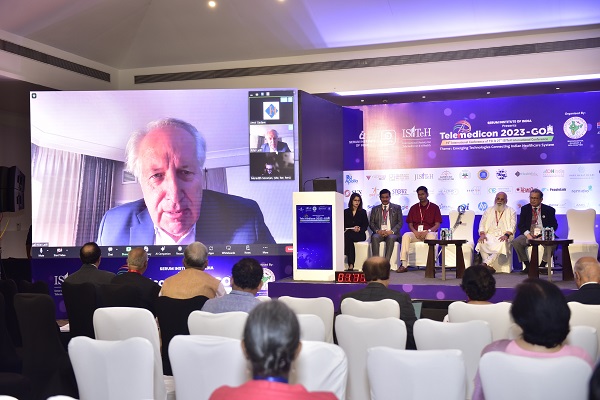
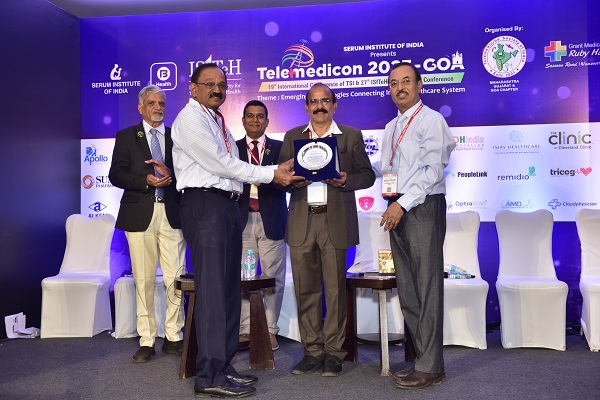

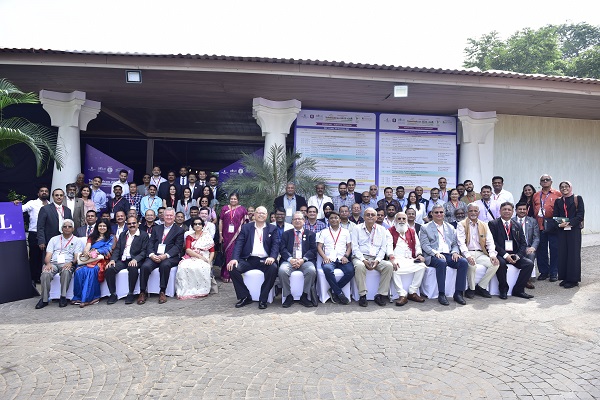
TELEMEDICON 2023 Feedback
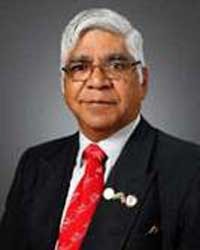 Dr.Ganapathy: Accolades, acclamations, applauses, admirations approvals, awards, cheers, commendations, encomiums, eulogies, endorsements, honours, ovations, praises, panegyrics, paeans thumbs up icons, tributes all freely flowing in all Whats App Groups, from old and young, from veterans and initiates speak for themselves. With my limited vocabulary I am at a loss for words. I would like to join every member of the TSI in thanking the Telemedicon2023 for a fantabulous event. Rattaji obviously did not behave like a Chairman. He was the First among equals. I am also pleased to see the difference of opinion in the various WA groups over the last week. The hundreds of postings indicate a personal involvement. Dissent is the basis of all democracy. Progress is not through consensus. New blood is essential . No one is indispensable. The outgoing TSI team have done a good job. I am sure the current team will steadily raise the bar. We do not want an incremental growth. It should be a radical transformation. This can only happen with a 100% participation. It is better to have loved and lost than not to have loved at all !!
Dr.Ganapathy: Accolades, acclamations, applauses, admirations approvals, awards, cheers, commendations, encomiums, eulogies, endorsements, honours, ovations, praises, panegyrics, paeans thumbs up icons, tributes all freely flowing in all Whats App Groups, from old and young, from veterans and initiates speak for themselves. With my limited vocabulary I am at a loss for words. I would like to join every member of the TSI in thanking the Telemedicon2023 for a fantabulous event. Rattaji obviously did not behave like a Chairman. He was the First among equals. I am also pleased to see the difference of opinion in the various WA groups over the last week. The hundreds of postings indicate a personal involvement. Dissent is the basis of all democracy. Progress is not through consensus. New blood is essential . No one is indispensable. The outgoing TSI team have done a good job. I am sure the current team will steadily raise the bar. We do not want an incremental growth. It should be a radical transformation. This can only happen with a 100% participation. It is better to have loved and lost than not to have loved at all !!
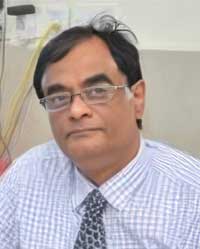 Dr. Selvakumar: Thanks to dr ratta Speakers were off high quality Introduction of dr Ganapathy for quiz was amazing Time management personally by dr ratta was super Food quality was very tasty and rich started by exacises to reduce my calories Overall the the conference was of 7 star ratting Exhibit showcasing was in par excellent ENTERTAINMENT WAS SUPER WITH FUN THANKS to dr ratta again single man show lessons to be learnt from him how to manage such conferences My sincere thanks and appreciattin to old EC team with spl thsnks to dr murthy for excellent management for the last 4 yrs Welcome to the new EC team ism sure this team will tske to greater heights with leadership of dr kim Members absence was only defect in telelmedicon confrence atl we should have double the attendance Nothing more can be done by the TSI in showcasing yearly event I thsnk all the members who attended for the grouth of TSI the meet with there support.
Dr. Selvakumar: Thanks to dr ratta Speakers were off high quality Introduction of dr Ganapathy for quiz was amazing Time management personally by dr ratta was super Food quality was very tasty and rich started by exacises to reduce my calories Overall the the conference was of 7 star ratting Exhibit showcasing was in par excellent ENTERTAINMENT WAS SUPER WITH FUN THANKS to dr ratta again single man show lessons to be learnt from him how to manage such conferences My sincere thanks and appreciattin to old EC team with spl thsnks to dr murthy for excellent management for the last 4 yrs Welcome to the new EC team ism sure this team will tske to greater heights with leadership of dr kim Members absence was only defect in telelmedicon confrence atl we should have double the attendance Nothing more can be done by the TSI in showcasing yearly event I thsnk all the members who attended for the grouth of TSI the meet with there support.
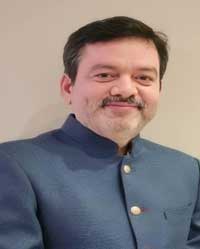 Dr. Raj Raval, Gujarat Chapter of TSI: On behalf of TSI GUJARAT CHAPTER, I’m thanking Dr.Ratta sir for involving us in organising squad although he knows he was very much able to do own his own. We learnt lot many things from him. He literally took all the pains to deliver wonderful event to us. Contents, New ideas pitching, timings, industries participation, food , cruise….everything were fabulous.
Dr. Raj Raval, Gujarat Chapter of TSI: On behalf of TSI GUJARAT CHAPTER, I’m thanking Dr.Ratta sir for involving us in organising squad although he knows he was very much able to do own his own. We learnt lot many things from him. He literally took all the pains to deliver wonderful event to us. Contents, New ideas pitching, timings, industries participation, food , cruise….everything were fabulous.
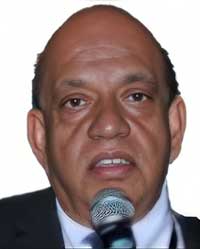 Dr. Satyamurthy: You are incredible Dr.Selva. Nice to see your remarks. Dr.Ratta was the dream boy organiser of utmost sincerity, commitment and recorded his hattrick of conducting 3 TSI conferences with grand finale of taking you all on Cruise ship which I missed. God bless our group young Margadharshaks.
Dr. Satyamurthy: You are incredible Dr.Selva. Nice to see your remarks. Dr.Ratta was the dream boy organiser of utmost sincerity, commitment and recorded his hattrick of conducting 3 TSI conferences with grand finale of taking you all on Cruise ship which I missed. God bless our group young Margadharshaks.
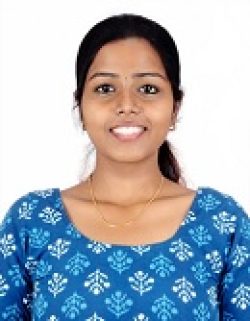
New AI Algorithms for Predicting Sudden Cardiac Death
Dr. Pavithra
Assistant Editor, Medindia.net
In a groundbreaking development, researchers have harnessed the power of artificial intelligence (AI) to potentially predict sudden cardiac death and evaluate an individual’s risk, ushering in the possibility of proactive preventive measures in global health strategies.
Identifying High-Risk Individuals with AI Analysis
Using AI analysis, researchers successfully identified individuals with a risk exceeding 90% of experiencing sudden cardiac death, a group that accounts for over a quarter of all such cases.
Sudden cardiac death stands as a significant public health concern, contributing to 10% to 20% of overall mortality. Traditional approaches have often struggled to pinpoint high-risk individuals, particularly on a personal level, making this discovery profoundly impactful.
Lead author Xavier Jouven, a distinguished professor of cardiology and epidemiology at the Paris Cardiovascular Research Center, Inserm, and the University of Paris in France, introduced an innovative approach that transcends the conventional focus on cardiovascular risk factors. This approach encompasses all medical information available in electronic health records, potentially revolutionizing our understanding and management of sudden cardiac death.
The research findings, set to be presented at the American Heart Association’s Scientific Sessions 2023, represent a monumental stride in cardiac healthcare. The research team leveraged AI to analyze medical information sourced from registries and databases in Paris, France, and Seattle.
They examined 25,000 individuals who had experienced sudden cardiac arrest and 70,000 individuals from the general population. These two groups were meticulously matched based on age, sex, and residential area.
A Wealth of Medical Data
The dataset used for analysis comprised over a million hospital diagnoses and ten million medication prescriptions, spanning medical records up to a decade before each individual’s demise.
Through AI, researchers created nearly 25,000 equations, factoring in personalized health criteria to pinpoint those at a high risk of sudden cardiac death. Each participant in the study received a tailored risk profile that incorporated their medical history, encompassing factors such as treatment for high blood pressure, a history of heart disease, and even mental and behavioral health concerns like alcohol abuse.
This comprehensive analysis can determine factors that either elevate or diminish the risk of sudden cardiac death, specifying a particular percentage and timeframe. For instance, an individual might have an 89% risk of experiencing sudden cardiac death within three months. This level of precision empowers healthcare professionals to proactively address and mitigate these risks.
Professor Jouven underscored the importance of AI in this context, stating, “While doctors have effective treatments such as risk factor correction, targeted medications, and implantable defibrillators, the use of AI is essential to identify a patient’s evolving medical history over the years, which creates a trajectory associated with an increased risk of sudden cardiac death. We hope that by providing patients with a personalized list of risk factors, they can collaborate with their healthcare providers to reduce these factors and ultimately decrease the likelihood of sudden cardiac death.”
In conclusion, the integration of artificial intelligence into healthcare signifies a significant paradigm shift in our approach to addressing and preventing sudden cardiac death. This research opens a promising avenue for personalized risk assessment, enabling individuals and healthcare providers to collaboratively and proactively mitigate the risk of this life-threatening condition.
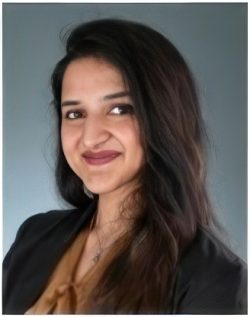
Diving into Precision: How AI Explores Personalized Cancer Treatment
Dr. Krishanga Srivastava
Associate Editor, Medindia.net
The landscape of cancer treatment is evolving rapidly, propelled by advancements in understanding tumor biology and genetics. As the intricacies of genetic mutations are revealed, the potential for personalized therapies grows.
In a recent study conducted by researchers at Charité – Universitätsmedizin Berlin and Humboldt-Universität zu Berlin, the intersection of artificial intelligence (AI) and cancer treatment was explored. The study specifically investigated whether generative AI tools, exemplified by ChatGPT, could contribute to the complex decision-making processes involved in crafting personalized cancer treatments.
The Complexity of Precision Oncology
Precision oncology, a specialized field within personalized medicine, hinges on the identification and targeting of specific genetic mutations responsible for tumor growth. This approach involves a meticulous analysis of the genetic makeup of tumor tissue, leading to the crafting of individualized treatment recommendations.
The interdisciplinary collaboration at Charité, known as the “molecular tumor board” (MTB), involves experts from pathology, molecular pathology, oncology, human genetics, and bioinformatics. Their collective insights aim to decipher the most promising treatments based on the latest scientific studies, culminating in personalized and effective treatment plans.
The Role of Artificial Intelligence in Treatment Decisions
The researchers, including Dr. Damian Rieke, Prof. Ulf Leser, Xing David Wang, and Dr. Manuela Benary, sought to explore whether AI could streamline and enhance this complex decision-making process.
Published in the journal JAMA Network Open, their study involved using large language models like ChatGPT to scan scientific literature for potential personalized treatment options automatically. However, the results indicated that while AI models could identify treatment options in principle, they fell short compared to the capabilities of human experts.
The researchers created ten molecular tumor profiles for fictitious patients, challenging both a human physician specialist and four AI models to identify personalized treatment options. The outcomes were then presented to the MTB for assessment without disclosing the origin of each recommendation.
The study revealed that, while AI occasionally identified surprisingly good treatment options, it overall performed less effectively than human experts. Challenges such as data protection, privacy, and reproducibility were also highlighted in the context of real-world patient applications.
Despite the current limitations, Dr. Damian Rieke remains optimistic about the potential contributions of AI in medicine. The study demonstrated that as AI models continue to advance, their performance improves. This opens the door to enhanced support for complex diagnostic and treatment processes, with the caveat that human oversight remains essential for result verification and treatment decisions.
Charité’s Commitment to AI in Medicine
The study is part of Charité’s broader initiative to leverage AI in patient care Prof. Felix Balzer, Director of the Institute of Medical Informatics, emphasizes the potential benefits of AI in medicine.
Projects within Charité, such as fall prevention in long-term care and AI-based prognosis following strokes, highlight the institution’s dedication to advancing the intersection of medicine and technology. The ongoing TEF-Health project, led by Prof. Petra Ritter, aims to facilitate the validation and certification of AI and robotics in medical devices.
As the field of oncology continues to embrace the era of precision medicine, the study at Charité sheds light on the evolving role of artificial intelligence in personalized cancer treatment. While AI models may not replace human expertise, their continual improvement suggests a promising future in providing valuable support for complex medical decision-making processes.
The careful integration of AI https://www.medindia.net/medical-quiz/quiz-on-artificial-intelligence.asp into the medical landscape, coupled with human oversight, is key to unlocking new frontiers in patient care and treatment.
“As AI advances, so does its potential to support complex medical decisions. The future lies in the collaboration between technology and human expertise.”
Telemedicine – News from India & Abroad
AI System Offers Potential for Early Autism Diagnosis
A recently created artificial intelligence system effectively diagnosed autism in children aged 24 to 48 months using specialized brain MRIs….Readmore
New Migraine Management Wearable Introduced
Dr. Reddy’s Laboratories introduced the launch of Nerivio, an FDA-approved wearable therapy device designed for drug-free migraine management…….. Readmore
Medical Wearable Tech Hits $100 Billion in 202
The medical wearable tech market is estimated to surpass $100 billion in 2023, with an anticipated 15% compound annual growth rate till 2030…..Reademore
AI-Driven Muscle Metrics Aids the Growth Standards for Kids
Brigham researchers utilized artificial intelligence to analyze MRI scans, producing a reference growth standard and a rapid……Readmore
TN – TSI invites all the TSI Chapters and Members to submit information on their upcoming Webinar or Events (50 words), News related to Telemedicine (200 words) or short articles (500 words) for the monthly e-newsletter.Guidelines for submission to TN TSI Newsletter-
- Report can be from 500 to 600 words
- Report Should be relevant to Telemedicine or Medical Informatics
- No promotion of self or any product
- Avoid plagiarism
- All references should be included
- Provide any attributions
- Visuals are welcome including video links
- Send full authors name, degrees, affiliations along with a passport sized photograph of good resolution. If multiple authors only main author photo to be sent.
Submission may be sent to – tsigrouptn@gmail.com
Editors reserve the rights for accepting and publishing any submitted material.
Editor in Chief – Dr. Sunil Shroff
Editors – Dr. Senthil Tamilarasan & Dr. Sheila John
Technical Partner- https://www.medindia.net

